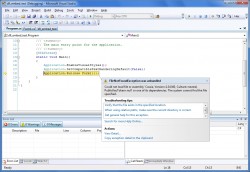Spyware in General
Spyware: a term computer users have been hearing about more and more often during their travels through the World Wide Web, or through visits to the repair shop. Spyware is something that has been becoming increasingly common on systems. A system brought online with no protection is completely vulnerable within the first few minutes it is connected to the Internet. Statistically speaking, you have about 20 minutes before the system is completely loaded up with spyware and malware. It has become more of a common problem than virus infections. Most forms of spyware do not outright destroy your computer system, but rather, create various annoying issues and also result in an overall negative impact on system performance. It can sometimes render the speediest 3.2GHz system helpless, making it act like an old 266MHz machine on a good day. For you, the user, there has yet to be an instance where spyware helps in some fashion and while remaining free of any negative attributes. Spyware infests your system, compromises privacy and security, and goes on to bog down system performance and Internet bandwidth.
What is Spyware?
Taken down to its simplest form and to be quite general, spyware is a software technology that assists in information gathering. The kind of information being gathered depends on how the spyare was written and what it was made to target. Once installed on a system, it can collect password data, bank and credit data, information on web surfing habits, email addresses, or just about anything else that you may consider a breach in privacy. This information is gathered from your computer and then relayed over the Internet to advertisers and any other interested parties, as allowed and directed by the piece of spyware. This definition, however, does not include or apply to all forms of software that fall under the heading of “spyware”. A breakdown of the different categories of spyware will be covered later on in this article.
Why Should I Bother to Protect My System if it Contains Nothing of Value?
The Internet can be a great place to visit and can contain a wealth of information that is made readily available at your fingertips, but like anyplace else, you must exhibit a certain degree of caution while making your way around. Wariness coupled with awareness can go a long way to help combat spyware.
A common rebuttal as to not making a good effort in the area of system security is this common excuse: “I don’t keep sensitive data on my computer. Why would anyone care to hit my computer with spyware and malware?” Machines that can be easily compromised are usually turned into servants for launching larger attacks and flood their Internet connection as a result. In other words, your system will be quite easily turned into a zombie computer without adequate protection, which will go to hurt other computer users. Additionally, there can be a significant amount of data transferred while your computer is serving as this kind of host, and many ISPs have limitations on a user’s monthly bandwidth, which can include a speed cap or disconnection of service.
If you’re a firm believer in the argument that you “don’t have any important data on you machine,” just take into consideration that your computer has the potential for conducting illegal activities and privacy invasion. Like owning car, owning a computer comes with certain responsibilities that must be fulfilled so that harm does not befall others on the information superhighway.




 AdamTheTech.com and respective content is Copyright 2003-2026.
AdamTheTech.com and respective content is Copyright 2003-2026.